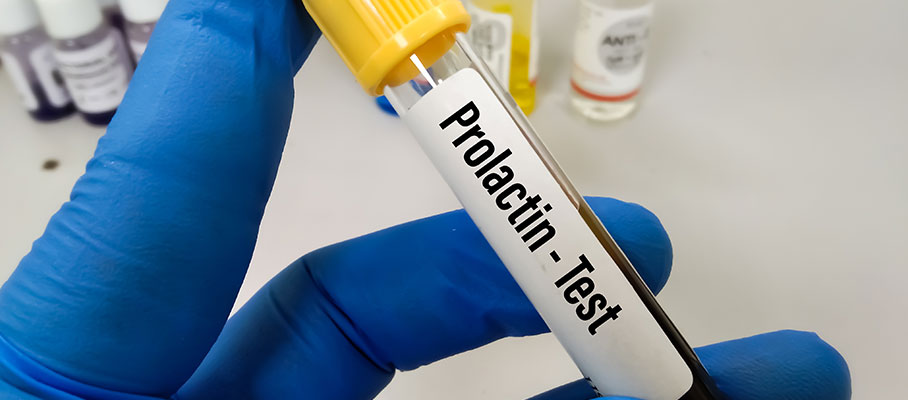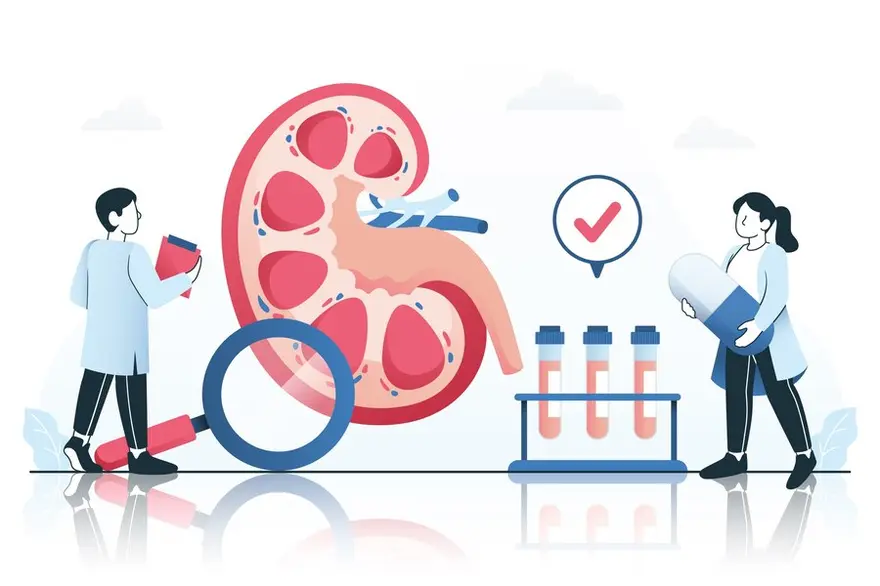Disease
Prolactin Test Normal Range, High vs Low and Results
139745 Views
0

What is Prolactin Test?
Prolactin is an important hormone that helps regulate lactation, breast growth, and other functions related to reproduction. A prolactin test measures how much of this hormone is in your blood; the higher your level, the more likely you are to produce milk during breastfeeding. Pregnant women or who have recently given birth often have elevated prolactin levels because their bodies produce large amounts of the hormone. Men also have prolactin in their bodies, but it doesn't involve reproduction.
Hyperprolactinemia is a condition where levels fall below the normal range. However, this illness is quite uncommon and generally results from a pituitary gland that is not functioning properly. This can also happen due to Sheehan syndrome, an uncommon but fatal postpartum condition that causes pituitary insufficiency.
Hyperprolactinemia, or high prolactin levels, is increasingly frequent and has a wide range of causes. A straightforward test is available to determine the amount of prolactin in the blood. It can determine whether the levels are too high or too low.
What is Prolactin?
Prolactin also known as PRL or Lactogenic hormone is a hormone produced by the pituitary gland, located just below the brain. It basically tells the body to produce breast milk when a woman is pregnant or breastfeeding. Prolactin is important for male reproductive health as well, it has got a role in testosterone secretion, which leads to sperm formation.
For females who have just delivered a baby, a rise in prolactin naturally results in milk production. Breastfeeding or pumping breast milk sends a signal to the brain to stimulate prolactin. The prolactin hormone helps milk glands in the breasts know when to produce milk.
Why Do I Need a Prolactin Level Test?
Doctor Recommends this test if you are suffering from any of the following symptoms.
For Women
- Milk production unrelated to delivery (galactorrhea)
- Discharge from Nipples
- Decreased sex drive
- inability to conceive (infertility)
- Irregular menstruation or amenorrhea (amenorrhea)
- Headache or
- Loss of vision etc.
For Men
- Decreased Sex drive
- Hard to get an erection
- breast tenderness or enlargement
- Breast milk production (very rare)
Postmenopausal patients with vision problems or headaches can also be tested for elevated prolactin levels and possible prolactinomas pressing on nearby structures in the brain.
If you have a prolactinoma, your prolactin levels may be checked during treatment to see how well the treatment is working. Following treatment, your doctor may monitor your prolactin levels over time to see if the tumour has recurred.
Other symptoms vary depending on whether you are male or female. For women, symptoms vary depending on whether menopause is present or not. Menopause is the time in a woman's life when menstruation stops, and she can no longer conceive. It usually starts around the age of 50 in women.
Prolactin Levels May Need to Be Tested Too
Certain conditions can warrant the need to measure how much of the Prolactin hormone is there in the blood. Changes in normal prolactin levels can happen in physiological conditions too. For example, when women are pregnant or have just given birth, they will have higher levels of prolactin making it easier for them to make breast milk. A Prolactin test can also sometimes reveal other issues caused by this hormone.
Book your Prolactin test with Metropolis and get world-class lab services.
Symptoms that can give clues about Normal Prolactin levels may include:
In Women
- Pain and uneasiness during sex
- Unusual body and facial hair growth
- Lactation outside pregnancy or childbirth, what is known as galactorrhea
- Irregular or no periods
- Suffering from prolactinoma, i.e. having symptoms of a growth on the pituitary gland
In Men
- Reduced sex drive or other fertility problems
- Difficulty in getting an erection
- Suffering from prolactinoma
Sometimes there are common symptoms such as constant and unexplained headaches, or vision problems etc. in both men and women, which can also be taken as signs when a doctor might have a person tested for Prolactin normal levels. The test is a blood test done, since the level of the hormone keeps changing throughout the day, with it being the highest in the morning, doctors suggest, to go for a test approximately 3-4 hours after a person has woken up.
Prolactin Test: Prolactin Levels and Their Effects on Fertility
If the prolactinoma tumors put pressure on the pituitary gland, this might lead to stoppage of estrogens or progesterone hormone production, leading to infertility, which is rare and farfetched. Low prolactin levels can tamper with periods, stop periods completely, reduce sex drive or cause vaginal dryness. If men on the other hand, have high levels of Prolactin, this might lead to erectile dysfunction and also low sex drive, sometimes loss of body hair is also a symptom.
Normal Ranges of Prolactin
Normal Range for prolactin are:
- Men: Below 20 ng/mL (425 µg/L)
- Nonpregnant Females: Below 25 ng/mL (25 µg/L)
- In Pregnant females: 80 to 400 ng/mL (80 to 400 µg/L)
The normal range of prolactin may vary slightly among different laboratories. Different laboratories use other measurements or test different samples. Ask your consultant doctor about the interpretation of your specific test results.
Do not ignore any symptoms. Keep checking your health with our preventive packages. Book TruHealth Full Body Smart Women health checkup package here.
Raised Amount of Prolactin
Various disease conditions, such as renal disease, thyroid issues, and illnesses that affect the hypothalamus or pituitary gland in the brain, can result in hyperprolactinemia. A follow-up prolactin test is generally required since a prolactin test May not identify the underlying cause of elevated prolactin levels.
High prolactin levels can occur in people who have the following conditions:
Common Physiological and Pathological Conditions which Cause Raised amount of Prolactin in Blood.
| Physiological Conditions | Pathological Conditions | |||
| Pituitary Disorders | Central Nervous System Disorder | Systemic Disease conditions | ||
| Pregnancy | Prolactinomas | Tumours | Severe Hypothyroidism | |
| Breastfeeding | Mixed Gangliocytoma- Pituitary Adenoma | Granulomatous Diseases | Liver Cirrhosis | |
| Stimulation of Breast | Cushing’s disease | Vascular Disorders | Acute or Chronic Renal Failure | |
| Sleep | Acromegaly | Autoimmune Disorders | Polycystic ovary Syndrome | |
| Stress | Not secreting adenomas | Hypothalamic Tumor or metastasis | Estrogen Secreting Tumors | |
| Condition in which Pituitary glad Shrinks (Empty Sella syndrome) | Cranial Irradiation | Chest wall Trauma | ||
| Pituitary stalk tumours | Convulsions or Seizure Disorders | Viral Infection such as Herpes Zoster. | ||
| Lymphoid hypophysitis | ||||
Prolactin levels can be increased by a wide range of medications, including those that may differ in their ability to impair dopaminergic function in the central nervous system (CNS), such as dopamine precursors, inhibitors of L-aromatic amino acids decarboxylase, dopamine receptor blockers, and serotoninergic precursors, direct and indirect serotonin agonists, and antagonist of serotonin reuptake.
| Drugs that may cause an increased amount of prolactin in the blood | ||
| Antipsychotics | Typical | Haloperidol, Thiothixene, Chlorpromazine, Thioridazine, |
| Atypical | Amisulpride, Zotepine, Risperidone, Molindone, | |
| Antidepressant | Tricyclics | Desipramine, Amitriptyline, Clomipramine Amoxapine |
| SSRI | Sertraline, Paroxetine, Fluoxetine | |
| MAO-I | Clorgyline, Pargyline, | |
| Other Antipsychotics | Alprazolam, Buspirone | |
| Antiemetics | Domperidone, Metoclopramide, | |
| Drugs used for Treatment of Hypertension | Verapamil, Alpha-methyldopa, Reserpine, | |
| Narcotics Drugs | Morphine | |
| Histamine 2 receptor Antagonists | Ranitidine, Cimetidine, | |
| Miscellaneous Drugs | Physostigmine, Fenfluramine, Chemotherapy agents | |
Low amount of Prolactin
Your pituitary gland may not operate fully if your prolactin levels are below the usual range. This is referred to as hypopituitarism.
Low prolactin levels can result from some medications. They consist of the following:
- Vasopressors such as Dopamine
- Antiparkinson medications such as Levodopa
- And alkaloids used to treat headache
Procedure of Prolactin Test
Prolactin testing is the same as blood testing. It takes a short while in a lab or at your doctor's office. You're not required to get ready for it. Generally, the sample is taken three to four hours after awakening in the morning. You have a vein in your arm taken for blood. There isn't much discomfort. You might feel a tiny pinch as the needle is inserted, followed by a little pain.
Certain birth control pills, medications for high blood pressure, or antidepressants may impact the test findings. Before the test, let your doctor know about your medications. Results may also be impacted by poor sleep, Extremely stressful situations, and excessive exercise the day before the test.
Interpretation of Prolactin Test Results
The results of a prolactin blood test are expressed in nanograms per millilitre (ng/mL) and microgram per litre. The test report will provide the reference range to interpret your prolactin levels. The comparison of prolactin levels between groups of healthy people depending on their biological sex and pregnancy status allows reference ranges for prolactin to be established. However, there is no defined normal prolactin level for everyone, and reference ranges can differ between laboratories.
The findings of a prolactin test can be interpreted in several ways, depending on a person's health and if they have previously undergone prolactin testing, among other things. Always seek medical advice to interpret prolactin test results in the proper medical setting.
Hyperprolactinemia, or having a very high amount of prolactin in the blood, may be indicated in nonpregnant persons if their initial prolactin levels are elevated. However, a follow-up examination is generally requested following a fasting period to confirm the diagnosis because specific foods can impact prolactin levels.
Get The Right Treatment For High Levels of Prolactin
Seizures, lung cancer, stress due to prolonged illness, or trauma, can also be the reason behind high prolactin levels. Doctors would probably put the person on medication to treat high levels of Prolactin. If a person has prolactinoma, medication can help reduce the size of the tumor, if not; surgery is the solution to remove these tumors.
A few simpler ways as advised by your doctor to reduce high levels of Prolactin may include:
- Dietary changes
- Stopping rigorous workouts that burn you
- Avoiding wearing clothes that over stimulate your nipples
- Taking vitamin supplements (such as Vitamin B-6 or Vitamin E)
To sum up, an endocrinologist can help with the right treatment needed based on the past history, ongoing medications etc, and will also guide on the dietary and lifestyle changes to be followed post treatment or surgery. There is also a condition known as idiopathic hyperprolactinemia, where there might be no specific or underlying cause for the high levels, and this goes away without much medical help or interference. It is to be noted that both Prolactinoma and Hyperprolactinemia are not life threatening, they might cause after or side effects post medication or surgery, but they gradually go away.
 Home Visit
Home Visit Upload
Upload














1701259759.webp)









 WhatsApp
WhatsApp